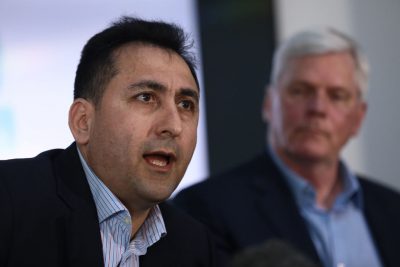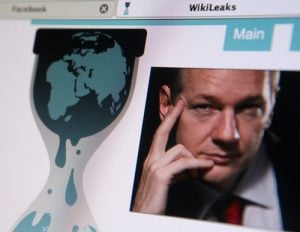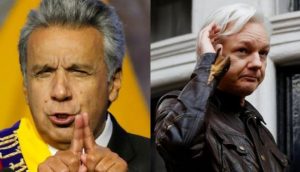“I Was Fired for Helping Julian Assange, and I Have No Regrets”

We talk to Fidel Narvaez, the ousted Ecuadorian diplomat who handled Julian Assange’s case about why Lenín Moreno caved to international pressure, broke his promises, and gave Assange up to British authorities.
***
Assange had been granted asylum in 2012, at the height of Latin America’s Pink Tide, when progressive governments across the continent challenged US interference in the region. Six and a half years later, Assange’s expulsion reflects a rightwards shift in Ecuadorian politics and a new president, Lenín Moreno, willing to serve US interests.
For his cooperation, Moreno has been warmly received by Washington, with Secretary of State Mike Pompeo expressing his enthusiasm to “continue to work in partnership” with Ecuador.
To discuss the dynamics behind Ecuador’s decision to expel the Australian Wikileaks founder, Jacobin spoke to Fidel Narvaez, the former Ecuadorian consul in London, who was instrumental in obtaining asylum for Assange in 2012, and who spent six years at the embassy with him.
Stefania Maurizi: When did you first hear about Julian Assange?
Fidel Narvaez: I first heard of Julian in 2010, when Wikileaks began publishing the archives of American military and diplomatic document. I personally approached him in 2011, because my government was interested in making public all the diplomatic cables on Ecuador. We were not looking for privileged access to the cables, but we did want them available in the public domain. To that end, in May 2011, Wikileaks released all those documents — and with no strings attached.
Since then, I had maintained some contact with the Wikileaks team, so when Julian reached the stage where he needed protection, and knocked on Ecuador’s door, he came to me first. I felt very strongly about the idea of protecting him, because my background is not in diplomacy, but in human rights. I was absolutely convinced that he needed protection.
SM: Did you ever perceive that by providing protection to Assange, Ecuador’s then president, Rafael Correa, wanted to antagonize the United States?
FN: The United States is a major superpower. It’s also Ecuador’s most important economic partner, so it’s not in our interest to look for a fight. However, we did want to make clear that we were not prepared to have the same relationships that we historically had. That’s why we said “no” to the Manta US military base: we wanted to exercise our sovereignty in accordance with our new Constitution, which allows no foreign military presence in Ecuador.
When WikiLeaks cables brought to light one American ambassador’s interference in Ecuadorian internal affairs, she was subsequently expelled. We also expelled several CIA agents, because they were interfering with our police forces. We refused to enter free trade agreements with the United States, because they weren’t the best deal for our country. In the case of Julian, we were not obliged to provide asylum, but we saw it as a human-rights issue, and the right thing to do.
SM: What happened immediately after you granted him asylum?
FN: The United States, of course, was not happy, and I think they were acting through the United Kingdom. The official American discourse was to deny that they were going after Julian. But the day before we announced the asylum, the United Kingdom delivered a letter threatening to enter the embassy to arrest Julian. They also deployed a disproportionately large contingent of police, and at night they closed the street to normal traffic. There were policemen everywhere: they were outside every window and they were even inside the building, because there was an interior patio. Ecuadorian diplomacy reacted fast and publicly rejected the threats: you can’t storm an embassy, not even during a war. The British backtracked, and even tried to say that we had misunderstood. In any event, Ecuador stood firm and granted asylum. We protected Julian for six years until the change in government.
SM: What was the most difficult time?
FN: The night the British threatened the embassy was probably the tensest, but after that, I would say the US elections, when WikiLeaks published the documents from the Democratic Party.
SM: Did the United States send any official diplomatic communication on that occasion?
FN: No, not as far as I know. I can only speculate that the pressure was delivered in a diplomatic way, probably through the ambassador in the United States. Also, for the first time, the government suspended Julian’s internet connection during the elections, for something like ten days. However, Ecuador was not going to withdraw protection, not under President Correa. But that was a difficult moment.
SM: Were you ever afraid?
FN: Personally, no. However, during those years, there were a couple of times when the embassy received threats, mostly by post. We also received white powder in envelopes.
SM: How was Julian’s relationship with staff at the embassy?
FN: Contrary to what Moreno’s government led people to believe, there was mutual respect between Assange and the diplomatic and administrative staff at the embassy.
SM: The Spanish newspaper El Paìs recently revealed that UC Global, the security company hired by Ecuador to protect Julian Assange inside the embassy, was actually spying on him, as well as his staff and every journalist, lawyer, and activist who visited him. El Paìs reported that the company shared the information with the CIA. Had you ever suspected anything like that?
FN: I never trusted the security in the embassy. They were brought on in 2012, two months after Julian’s arrival. We needed security because the embassy didn’t even have cameras installed, but I think the company was very unprofessional. In order to secure their own employment they were misrepresenting Julian’s behavior inside the embassy.
SM: Do you have any examples of this?
FN: Let me describe one small episode. At the very beginning, during the night somebody was throwing something from the streets onto Julian’s windows. Assange immediately went to see the security guard and asked him to look through the security cameras. The guard didn’t speak English, he didn’t know what Julian wanted, he didn’t let Julian look at the cameras, and there was a little argument. What does the company do? It complains about him. On the video, I saw that the British police outside were having fun, throwing coins at Julian’s window at two o’clock in the morning.
So I complained about the company, saying that Julian was not the problem, and asking to see the video — which they never produced, claiming it was lost. I have to say, we did underestimate the extent of this company’s espionage. We knew that UC Global had started to produce very inaccurate reports, misrepresenting what was going on in the embassy. It was in the interest of the company to portray Julian as a problematic presence. Why? Because that way they were justifying their own employment.
SM: It’s the old strategy “keep the problem going, so the money keeps flowing” …
FN: Exactly. We underestimated that. Soon enough, the company’s reports were leaked and, gaining access to those, the Ecuadorian press started to attack Julian, pressuring the government to get rid of him. Then, based on those reports, the international media also rolled out aggressive smear campaigns, especially the Guardian and CNN.
SM: The Guardian even reported on “Russia’s secret plan to help Julian Assange escape from the UK” …
FN: First of all, there is an obsession with trying to link WikiLeaks to Russia. I don’t think there is any ground for this — neither in terms of the Russian state, nor Russian intelligence services. In 2017, Ecuador appointed Julian as a diplomat and requested the UK Foreign Office to register him in the diplomatic list. The idea was to increase protection of the political asylee, in a way similar to what the United Kingdom has done with the journalist Nazanin Rafcliffe [detained by Iran]. The United Kingdom rejected this, and though Ecuador could have taken the case to the International Court of Justice, there was another option: to appoint Julian as a diplomat to a third country that might accept him. So it is true that Ecuador did consider appointing him as a diplomat to Russia, but in the end, it didn’t happen.
SM: Why is that?
FN: I don’t know for sure, but I think that the United States learned of the plan and threatened unfriendly action. That was the breaking point. After that, Ecuador began withdrawing its protection. That’s the fact. The Guardian published a very different story, saying that Russia had devised a secret undercover operation to smuggle Julian out.
SM: A James Bond story …
FN: That’s how the Guardian presented it. The article said that I was Moscow’s contact, in other words that I was plotting with Russia. I filed a complaint against the newspaper, and it is still being assessed.
SM: Why do you think Lenín Moreno stopped protecting Julian?
FN: Lenín Moreno never liked Julian, not even when he was vice president. He doesn’t understand what WikiLeaks is or what they do. At the beginning of his government, Maria Fernanda Espinosa — who became the president of the UN General Assembly soon afterwards — was the one protecting Julian, I think even despite Moreno’s dislike for him. But when she wasn’t there anymore, that was when I think Julian’s fate was decided: they started making the case to end his asylum. How? They isolated him, they tried to break him down, so that he would leave the embassy of his own accord. They failed.
When the isolation started arousing international condemnation, they tried to impose the so-called “protocol,” which was an outrageous prison regime of putting banana peels all over the floor to provoke him and get an excuse to kick him out. That was one of the strategies. Another was to defame him in order to justify his expulsion, and to approach the British and the Americans in order to hand Julian over.
SM: You were no longer a diplomat at that time, right?
FN: No, I left in July 2018, because I was asked to. They didn’t want me anymore — and I didn’t want them anymore either. It was unbearable. Julian’s isolation began when I was there. I witnessed it.
SM: Moreno obtained a 4.2 billion-dollar deal from the International Monetary Fund (IMF). Do you think it was related to his decision to stop protecting Assange?
FN: Moreno was desperate to get cash from any source. Under Correa, we avoided deals with the IMF, but with Moreno things were different. I think he would have expelled Julian anyway, even if he hadn’t gotten cash for it, because it is part of his colonial mentality to be subservient, to try to please the United States. I wouldn’t be able to say whether Julian’s expulsion was a condition of the deal, but we do know that the United States has veto power with the IMF.
SM: You lost your privileged position; you are no longer a diplomat. Do you have any regrets?
FN: Of course, I’ve paid a price. I don’t think my job opportunities are very broad. If people Google my name, they see that the Guardian is calling me a “Russian plotter,” and that the government of Ecuador is trying to discredit me. But I don’t regret anything at all. As a diplomat, the most interesting people I met were in connection to providing asylum for Julian Assange, and in trying to help Edward Snowden. I would do it again, for sure.
*
Note to readers: please click the share buttons above or below. Forward this article to your email lists. Crosspost on your blog site, internet forums. etc.
Fidel Narvaez is the former Ecuadorian consul in London who was instrumental in obtaining asylum for Assange in 2012, and who spent six years at the embassy with him.
Stefania Maurizi is an investigative journalist for the Italian daily La Repubblica. She has worked on all major WikiLeaks releases and partnered with Glenn Greenwald to reveal the Snowden files about Italy.
Featured image is from Jacobin



